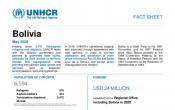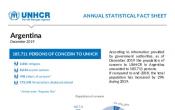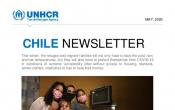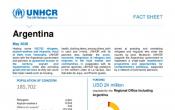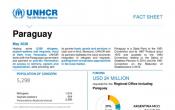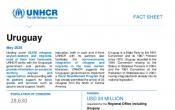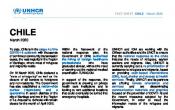Argentina Multi-Country Office
The UNHCR multi-country office for Southern Latin America based in Buenos Aires covers operations in Argentina, Bolivia, Chile, Paraguay and Uruguay. UNHCR's activities in Peru were covered under the Regional Office for Latin America until the end of 2018.
Operation: Argentina Multi-Country Office
Location
{"longitude":-65,"latitude":-34,"zoom_level":4,"iso_codes":"'ARG','BOL','CHL','PRY','URY'"}
By clicking on the icons on the map, additional information is displayed.
The boundaries and names shown and the designations used on this map do not imply official endorsement or acceptance by the United Nations.
Key Figures
| 2019 Year-End Results | |
| 2,800 | individuals participated in tailored trainings focused on labor market insertion, financial inclusion and entrepreneurship opportunities facilitated by UNHCR in cooperation with private sector partners |
| 2,300 | of the most vulnerable people of concern received multipurpose cash transfers and vouchers to meet essential needs |
| 2,000 | people were assisted with transitional shelter in Chile |
| 1,550 | people (mostly Venezuelan women and children) received warm clothes and blankets |
| 1,000 | people benefitted from protection services, such as legal information and orientation, primary health care and access to the internet in the “attention and orientation points” established in Argentina and the Plurinational State of Bolivia |
| 450 | Syrian refugees were resettled to Argentina |
| 2020 planning figures | |
| 10,000 | people of concern will have their economic inclusion strengthened through livelihoods activities |
| 4,000 | households will be provided with multipurpose cash grants for emergency assistance and first integration support |
| 3,190 | people of concern will receive GBV prevention, information and response services in border areas in Argentina, Bolivia and Chile |
| 1,500 | people of concern will receive legal counselling and access to documentation, referrals to RSD and migratory systems, including through family reunification, resettlement and complementary pathways |
Latest Updates
People of Concern
38%
Decrease in
2019
2019
| 2019 | 691,616 |
| 2018 | 1,120,647 |
| 2017 | 241,989 |

[["Refugees",8344],["Asylum-seekers",31277],["Others of concern",2518],["Venezuelans displaced abroad",649477]]
Loading ...
Argentina Multi-Country Office
< Back
2019
{"categories":[2015,2016,2017,2018,2019,2020],"budget":[5.149656436,4.8155183500000005,6.07133593,12.900431919999999,12.182285949999999,23.936397210000003],"expenditure":[3.3196832400000003,3.2570589699999997,4.51617457,10.60315681,10.4535918,null]}
{"categories":[2015,2016,2017,2018,2019,2020],"p1":[5.063435815999999,4.64695957,5.85626246,12.73168668,12.182285949999999,23.936397210000003],"p2":[0.08622062,0.16855878,0.21507347,0.16874524,null,null],"p3":[null,null,null,null,null,null],"p4":[null,null,null,null,null,null]}
{"categories":[2015,2016,2017,2018,2019,2020],"p1":[3.23346262,3.10502305,4.30890492,10.51268142,10.4535918,null],"p2":[0.08622062,0.15203592000000002,0.20726965,0.09047539,null,null],"p3":[null,null,null,null,null,null],"p4":[null,null,null,null,null,null]}
Loading ...
CHOOSE A YEAR
- 2015
- 2016
- 2017
- 2018
- 2019
- 2020
Operational context
As elsewhere in Latin America, 2019 was an especially volatile year, with the situation in the sub-region characterized by political, social and economic instability. Economic downturns led to social unrest and violent demonstrations; there was a change in government in the Plurinational State of Bolivia; and a constitutional reform process was initiated in Chile. Restrictive entry policies in the sub-region forced many refugees and migrants to resort to irregular means of travel and entry.The Venezuelan crisis was a constant feature in political discourse amongst the five countries in the sub-region. Argentina and Chile, the two countries with the largest Venezuelan populations, applied different reception policies: while Argentina continued applying an open-door policy towards refugees and migrants, from June, Chile introduced additional visa requirements, requiring Venezuelans to obtain a tourist visa or temporary residence permit to gain entry.
Population trends
The population of concern to UNHCR covered under this multi-country office grew to over 691,600 people. This figure comprised some 31,300 asylum-seekers, 8,300 recognized refugees, and 2,500 people of concern of various nationalities - in addition to nearly 649,500 Venezuelans displaced abroad.While 93% of people of concern to UNHCR were Venezuelan, Colombians, Cubans, Dominicans and Haitians continued to arrive and apply for international protection. Argentina and Uruguay also continued to welcome refugees through resettlement or complementary pathway programmes, including Syrian refugees from Lebanon and Salvadorian families with international protection needs.
Achievements
- In Chile, UNHCR reinforced its presence in Arica and established a presence in the Antofagasta region.
- As part of its community-based approach, UNHCR worked with some 30 Venezuelan grass-root organizations and provided information, capacity-building and support.
- UNHCR actively participated in the MERCOSUR Forum of National Refugee Commissions (CONARE) and supported the regional Quito Process.
- As a result of UNHCR’s advocacy, the Government of Paraguay recognized more than 700 Venezuelans as refugees using a group-based recognition approach.
- In the framework of the “cities of solidarity” regional initiative, UNHCR worked together with 30 local governments across the sub-region to improve the socio-economic inclusion of people of concern.
Unmet needs
- Due to a funding shortfall, support to national asylum systems in countries covered by the multi-country office was reduced, resulting in a backlog of over 31,800 cases.
- Additional funds are needed to scale up presence at key border entry points such as Salta, Cordoba and Mendoza (Argentina); Guayaramerin, Villazon, Villamontes (Bolivia, the Plurinational State of); and Chuy (Uruguay).
- Lack of funds curtailed emergency assistance capacity, including access to emergency shelters, primary health care and social support for some 2,000 vulnerable families in Chile.
- Like of funds also limited the Office’s capacity to support local and economic inclusion activities.
Working environment
A record spike of new asylum applications in 2017 had placed considerable strain on refugee status determination (RSD) procedures and asylum systems of various southern Latin American countries.The population of concern to UNHCR has continued to grow exponentially in Argentina, Bolivia, Chile, Paraguay and Uruguay in 2018, mainly because of the large-scale arrival of Venezuelans.
While retaining the possibility to apply for asylum, Venezuelans have benefitted in Argentina, Chile and Uruguay from other legal stay arrangements which have contributed to alleviate the impact of the influx on their respective asylum systems. Regardless of their status, most Venezuelans are considered to be in need of international protection. In addition, the profile of the Venezuelans arriving to the southern cone has recently shifted: humanitarian partners have monitored an increase of families with children in a more vulnerable situation entering through land border crossings, after weeks of travel through other countries.
Overall, the number of asylum-seekers is also growing exponentially, increasing the existing backlog and challenging the existing capacity of States. Governments in the region are considering the adoption of measures to control backlogs and reduce increasing numbers of unfounded asylum claims. At the same time, some countries are tempted to apply more restrictive border control measures posing difficulties in terms of access to the territory and to the asylum systems
Despite a favourable integration environment in the region, including right to work, access to education and health services, sustainable socio-economic inclusion needs strengthening, due to limited access to social protection and employment promotion schemes, affordable housing, financial services and decent employment opportunities.
The need for a coherent, coordinated and regional response to the Venezuela situation entails a thorough level of funding to cover financial requirements, which have increased exponentially during the past years, in particular after the dramatic influx of Venezuelans mainly to Chile and Argentina. In addition, after the 2016 New York Declaration, several countries in the region committed to enhance sustainable programmes for resettlement and other legal pathways, such as Argentina and Chile that became part of the Emerging Resettlement Countries Mechanism (ERCM), while Uruguay received donor support for its resettlement programme for refugees from the North of Central America.
Key Priorities
In coordination with governments, other UN agencies and other key strategic partners, including host communities, civil society, NGOs and private sector, UNHCR will promote, establish and consolidate comprehensive solutions framework in the Southern Cone to ensure a sustainable and effective protection and assistance responses for refugees, asylum-seekers, and statelessness persons in a context of mixed movements where access to the territory needs to be guaranteed. The implementation of the programme of cities of solidarity and the mobilization of public awareness for humanitarian issues are also considered as key priorities of UNHCR in this sub-region.These goals will be reached through an operational response of its protection and solution strategy, which spans over the following key objectives:
- Strengthen response to the Venezuela situation supporting effective reception mechanisms to respond to the protection and humanitarian needs of increasing people of concern while promoting local integration options. Border presence and monitoring will be reinforced in Chile and Argentina.
- UNHCR and key partners, consolidate quality and efficient asylum systems including the promotion of other pragmatic protection oriented responses for people of concern.
- UNHCR, in coordination with strategic partners promotes and contributes to the establishment of sustainable resettlement programmes and other legal pathways through community sponsorship models, government social services and multilateral mechanisms particularly for Syrian refugees as well as others, such as nationals of Central America.
- Consolidate, in coordination with strategic partners, a comprehensive response led by the government to promote local integration, socio-economic inclusion and access to sustainable livelihoods of all people of concern.
- Support the implementation of the programme “cities of solidarity” along with local governments.
- Support the Southern Cone to become the first region to eradicate statelessness.
- Mobilize support to regional and global humanitarian causes through public opinion and awareness raising initiatives to mitigate and counter potential manifestations of discrimination and xenophobia.

